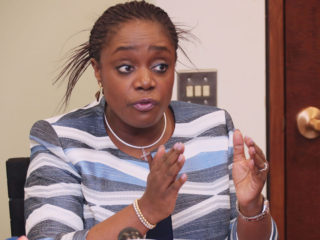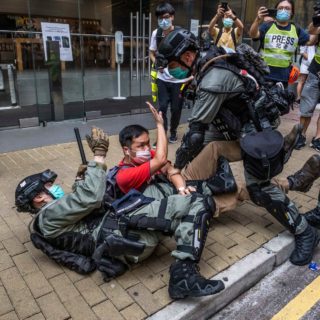
NARVA AND BUDAPEST — THE MUNICIPAL government’s offices in the Estonian city of Narva are just a snowball’s throw from Russia. From her window Katri Raik, the mayor, can watch cars and lorries trickling through a border checkpoint. More than 80% of Narva’s residents are ethnic Russians, a legacy of the centuries during which Narva was part first of the Russian Empire and then of the Soviet Union. Ethnic Russians, nearly a quarter of the population, have grown more integrated since Estonia became independent 30 years ago. Yet most still send their children to Russian-language schools and rely on Russian television and online media. “Just yesterday someone on the city council said ‘U nikh v Estonii tak [That’s how it is over there in Estonia],’” says Ms Raik.
A former interior minister, Ms Raik was elected in December pledging to bridge the gap. A new Estonian-language secondary school will open in September. The regional economy, once dependent on Soviet-era heavy industry, is now oriented towards the West. But Russia’s military buildup on the Ukrainian border is reminding Narva of where it sits. Opinion is divided along familiar lines. In several conversations, ethnic Estonians saw Russia as the aggressor, while ethnic Russians tended to think the risk of war exaggerated or to blame NATO. “We each know what the other thinks, so we simply don’t talk about it,” says Ms Raik.
Across eastern Europe, the threat of war in Ukraine evokes long-standing fears. Most countries, Estonia included, are NATO members and see no immediate risk of Russian soldiers pouring across the border. But Russian and Soviet expansionism has shaped their politics for decades, if not centuries. These days many eastern Europeans are at odds with the Kremlin over energy supplies or Russian-financed networks of corruption. Others have established friendlier relations, helped by trade, Russian-speaking minorities or politicians who get on with Vladimir Putin, Russia’s president. But even in such places, the crisis in Ukraine is causing problems.
The Baltic countries, which were Soviet territory until 1991, are the strongest voices for deterrence and harsh sanctions. “Interdependence means you can hurt the one who is dependent on you,” says Kaja Kallas, Estonia’s prime minister, whose mother’s family was deported to Siberia under Stalin. Her government has pressed Germany not to approve the Nord Stream 2 gas pipeline from Russia. It is also trying to send weapons to Ukraine, but Germany has been blocking the passing-on of German-made equipment. On January 27th Latvia’s defence minister called the German stance “immoral and hypocritical”.
Last summer, when Mr Putin wrote an essay claiming that Ukraine was not a legitimate historical nation, it rang alarm bells in Estonia, Latvia and Lithuania, because he had made similar arguments about them in the mid-2000s. Defence planners in these countries consider Russia an existential threat. “If Putin invades Ukraine, we’re next,” says a senior government official in one Baltic country.
In Romania and Bulgaria, things are more complex. Both countries are NATO members. But their politics are plagued by corruption, some of it tied to Russia. Politicians have not always been enthusiastic about American policies that link anti-corruption efforts to regional security. Whereas Romanian politicians have clamoured for years for NATO to upgrade its presence, Bulgarian ones tend to shy away from new deployments to avoid provoking voters with Russian sympathies. Still, both countries were furious when Russia demanded on January 21st that NATO pull allied forces out of their territory. They have welcomed American proposals to deploy more instead.
It is in central Europe that attitudes towards Russia are most ambivalent. Viktor Orban, Hungary’s populist prime minister, is friendly with Mr Putin and is due to visit him in Moscow on February 1st. He has imitated Mr Putin’s model of government by taking control, in effect, of his country’s media and judiciary and styling himself as the guardian of Christian Europe (against the godless EU, among others). He has bought Russian nuclear power plants and struck deals for Russian gas that circumvent Ukraine. His government has persistently called for the weakening of EU sanctions on Russia.
Milos Zeman, the Czech Republic’s president, is also cosy with Mr Putin, and has pressed to let Russian firms bid for contracts to supply Czech nuclear plants. In December he delayed the installation of the government headed by Petr Fiala over his choice of a pro-EU, anti-corruption foreign minister. But Czech opinion has shifted since revelations last year that a local ammunition dump was blown up in 2014 by Russian agents.
Poland’s government, too, has some affinity with Mr Putin’s. It is conservative, religious and nationalist, and is fighting with the EU over its efforts to turn judges into political pawns. Yet it is the most fiercely anti-Russian government in Europe. Jaroslaw Kaczynski, the head of the ruling party, lost his brother, then president, in a plane crash in 2010 which he believes (somewhat unfathomably) was caused by Russia. More importantly, the Russian Empire ruled much of Poland throughout the 19th century and tried to Russify its population. In the second world war Stalin carved Poland up with Hitler and executed much of its elite. Many Poles see Russia as a country that tried to eliminate them as a nation.
Eastern European countries will pay a price for isolating Russia. Their main vulnerability is energy. In October Moldova was forced to strike an expensive gas deal with Gazprom, and rising electricity bills nearly toppled Ms Kallas’s government in January. But only for the Baltic countries is Russia among the top five export markets. In no country is direct investment from Russia more than a tenth that from the EU, though there are pockets where it plays a significant role.
In Narva, for instance, about 30% of the firms in the city’s industrial zone are owned by Russians, reckons Vadim Orlov, the zone’s director. Russian businessmen want factories in a country governed by the rule of law, where they cannot be stolen by politically connected raiders. Why should Estonia back tough sanctions that could make things harder for its own Russian-owned businesses?
One possible reason is that Russia likes to use sanctions too, often abusively. Ms Kallas mentions 2007, when Russia retaliated for the removal of a memorial to Soviet soldiers in Tallinn by cutting off fuel supplies. Dumitru Alaiba, a Moldovan MP, recalls 2014, when Russia hit his country with an embargo after it signed an association agreement with the EU. “[We] have learned that dealing with Russia has risks,” says Ms Kallas. If eastern Europe’s ties with Russia are further weakened, Mr Putin will only have himself to blame.
By The Economist




